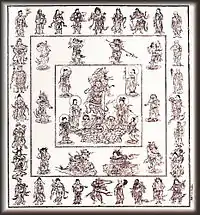Eight Great Yakṣa Generals
The Eight Great Yakṣa Generals (八大夜叉大将), or simply the Eight Yakṣa Generals are guardian deities in Buddhism. They are retainers of Vaiśravaṇa, guardian of the north and king of the yakṣas.

In East Asia, they are also variously known as the Eight Great Yakṣas (八大藥叉), the Eight Great Heavenly Kings (八大天王), and the Eight Brothers of Vaiśravaṇa (毘沙門八兄弟).[1][2]
Relationship to Vaiśravaṇa
The term yakṣarākṣasa has been used as a general term to denote the many classes of spirits in Indian mythology, combining the words yakṣa and rākṣasa.[3]
According to Buddhist mythology, Vaiśravaṇa is the chief of these beings, and long ago dwelt together with them in the realm of darkness. When Vaiśravaṇa converted to Buddhism, the many demonic spirits under his jurisdiction likewise assumed the role of devotees to the Buddha. Originally malevolent beings, their conversion led to their deification as benevolent guardian deities.
Among the many yakṣas under Vaiśravaṇa's rule, the Eight Great Yakṣa Generals are ranked at the top of the hierarchy. Always at Vaiśravaṇa's command, these deities command 36,000 yakṣas that serve their king and are said to protect those who venerate them. A similar list may be found among the Twenty-Eight Great Yakṣa Generals.[4]
Yakṣa Generals
Their names are given in the Commentary on the Mahāvairocana Abhisaṃbodhi Tantra (大毘盧遮那成佛經疏) as follows:
| Sanskrit | Kanji | Rōmaji | Pinyin | Vietnamese | Korean |
|---|---|---|---|---|---|
| Maṇibhadra | 宝賢 | Hōken | Bǎoxián | Bảo Hiền | 보현 |
| Pūrṇabhadra | 満賢 | Manken | Mǎnxián | Mãn Hiền | 만현 |
| Pañcika | 散支 | Sanshi | Sànzhī | Mật Chủ Mật Thân | 산지 |
| Śatagiri | 衆徳 | Shūtoku | Zhòngdé | Uy Thần Chúng Đức | 중덕 |
| Haimavata | 応念 | Ōnen | Yīngniàn | Chủ Tuyết Sơn Giả Ứng Niệm | 응념 |
| Viśākhā | 大満 | Daiman | Dàmǎn | Đại Mãn Trì Pháp | 대만 |
| Āṭavaka | 無比力 | Muhiriki | Wúbǐlì | Vô Tỉ Lực Vô Tỉ Thân | 무비력 |
| Pañcala | 密厳 | Mitsugon | Mìyán | Mật Nghiêm | 밀엄 |
See also
References
- "八大夜叉". 佛光大辭典 (in Chinese). Retrieved 2019-07-18.
- Chaudhuri, Saroj Kumar (2003). Hindu Gods and Goddesses in Japan. Vedams eBooks Ltd. p. 31. ISBN 9788179360095.
- Hidas, Gergely (2017). "Mahā-Daṇḍadhāraṇī-Śītavatī: A Buddhist Apotropaic Scripture". Indic Manuscript Cultures through the Ages. De Gruyter. pp. 449–486. JSTOR j.ctvbkjzkh.17.
- 武藤一機. "八大夜叉大将". 神魔精霊妖名辞典 (in Japanese). Retrieved 2019-07-18.